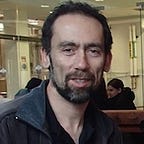Systematic Bias in Mathematics
An essay, There is No Such Thing as ‘White Math,’ by a Princeton professor of mathematics, Sergiu Klainerman, claims that the objectivity of mathematics justifies immunity from political ideology. I disagree. The human context of math education cannot be separated from mathematics itself.
Attempting such a separation and casting social responsibility and accountability as a manifestation of ‘white math’ is pedantic. Such a framing creates a strawman fallacy and retreats to the safe harbour of abstract symbols and proofs. The safe harbour overlooks the context of education and the ‘old boy’s network.’
I challenge Klainerman to support his assertion regarding the objectivity of mathematics by stating which system is objectively better: ZFC or Peano. Pro-tip: such an evaluation is subjectively dependent on context.
Math education is be inexorably linked to mathematics because every mathematician has gone through math education. I present an example of the educational context of mathematics being racist by employing the correlation of racism and wealth inequality in the context of math education.
Personal Story as a Teacher
I’ve taught mathematics at the high school level and at the university level, and have completed a mathematics education program. A pedagogical approach to creating assessments uses Bloom’s Taxonomy. Story problems and other more challenging ones occur higher up the pyramid.
In these exam problems lies the opportunity for the question to rely on situational knowledge, or life experience. An extreme example would be a well circulated 8th grade exam. Rather than considering the many contentious historical points, simply focus on the situation knowledge required. The situational knowledge required in the challenging questions farther up the Taxonomy pyramid may be less intense, but are nonetheless subtly pervasive.
A charter high school at which I taught in Michigan, US administered the sponsoring university’s required annual standardized tests. Many teachers called on the high school administration to challenge the university’s bias (required situational knowledge) that was pervasively present in the questions. The administration refused.
Subsequent to that standardized exam and for the rest of the year, I designed the chapter exams for my classes instead of using the exam bank (which was allowed by my teaching contract). The student body was 40/60 wealthy families and poor families, who shared a few cultural bonds. I used all of the best pedagogical research to scaffold my exams and designed the analyze, evaluate, synthesize questions so they relied on knowledge that the students of poorer families would have, but the students of wealthier families would not.
The wealthier students, upon realizing that they and their friends got many questions wrong, assumed that the questions were unfair. Complaints to the principal were lodged by the parents of the wealthier students. I showed the principal the statistics on each question, which showed that >65% of students answered the questions correctly (which met the definition of an acceptable question).
He noticed that the students answering correctly were the poorer students, and claimed that I was making biased questions in favour of poorer students. I asked him if he now sees the merits of challenging standardized tests with biased questions. He stormed off and refused to speak to me, or even look in my direction, for a week.
I week later he insisted that I change the grades of the wealthier students because the parents were still complaining. I refused. I told him he could fire me on the spot and change the grades himself. He refused. I continued to design the exam questions for the remaining three months of the school year. The parents continued to complain.
Wealth disparity is inextricably linked to the legacy of race. However the situation is far too complex to reduce it to a provocative label consisting of a single adjective and a single noun.
